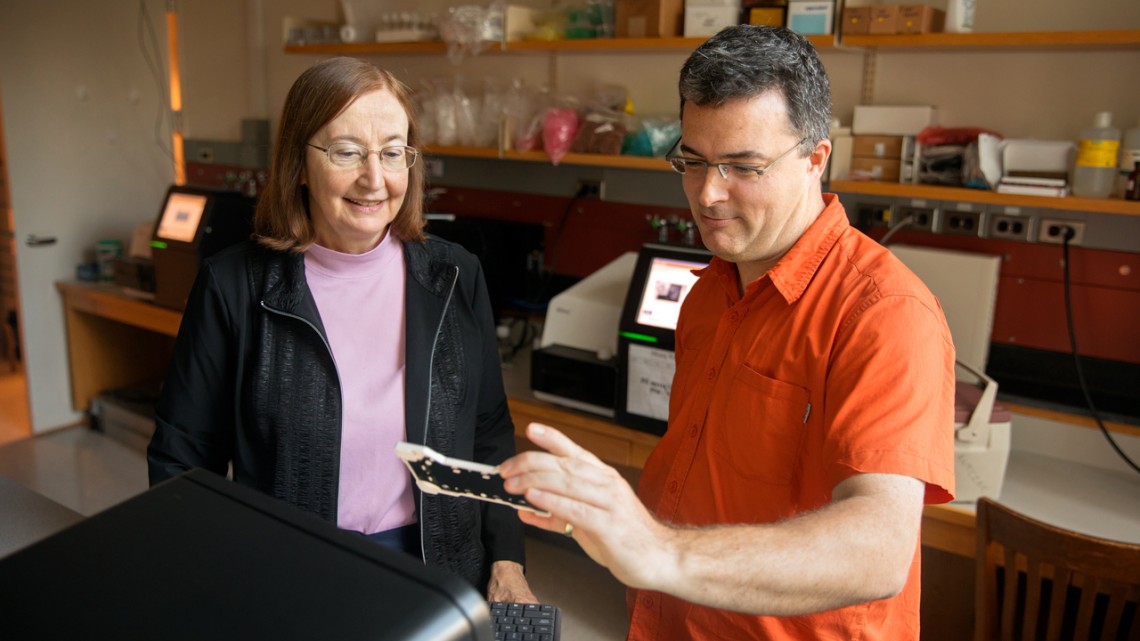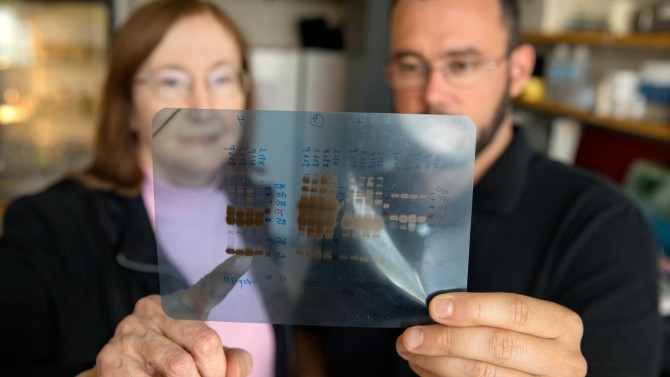
Maureen Hanson, the Liberty Hyde Bailey Professor in the Department of Molecular Biology and Genetics, and Andrew Grimson, associate professor of molecular biology and genetics, inspect a high-throughput DNA sequencer in the Biotechnology Resource Center.
$9.4M NIH grant funds chronic fatigue syndrome center
By Krishna Ramanujan
The National Institutes of Health announced Sept. 27 that Cornell is one of three institutions nationwide to receive funding to establish a collaborative research center for the study of myalgic encephalomyelitis/chronic fatigue syndrome (ME/CFS). Each center will serve as a hub that partners with other institutions to study the disease.
More than one million people in the U.S. suffer from ME/CFS, yet causes and effective treatments for the debilitating disease remain a mystery. ME/CFS leads to debilitating fatigue that is not helped by rest. Symptoms may include body pain, headaches, trouble thinking clearly, difficulty sleeping, and prolonged and unexplained fatigue following exercise or even mild physical exertion.
Cornell will receive close to $9.4 million over five years to establish the Cornell Myalgic Encephalomyelitis/Chronic Fatigue Syndrome Collaborative Research Center, which will span Cornell’s Ithaca campus, Weill Cornell Medicine, Ithaca College, the Boyce Thompson Institute, the Workwell Foundation, EVMED Research, the SOLVE ME/CFS Initiative and private ME/CFS medical practices.
“Being awarded an NIH ME/CFS Center means we have taken on a huge responsibility to the more than one million people affected by this life-limiting disease that has no FDA-approved drugs and a poor prognosis for recovery,” said Maureen Hanson, the Liberty Hyde Bailey Professor in the Department of Molecular Biology and Genetics, who will direct the center. “Understanding the biological basis of the illness is essential to develop therapies that will allow those who are now trapped in their beds and homes to resume active lives.”
The center will have three main research projects.
The first project, led by Dikoma Shungu, professor of physics in radiology at Weill Cornell Medicine, will use advanced imaging techniques, including MRI and PET scans, to image the brains of individuals with the disease compared to healthy controls. They will look for markers of neuroinflammation and oxidative stress to see if they are linked to the disease. Previous studies have suggested oxidative stress, neuroinflammation and possibly dysfunction in the mitochondria, the cell’s power producer, may be interacting in ways that create the symptoms of ME/CFS.
The second project, led by Hanson, will compare the content of extracellular vesicles between individuals with ME/CFS and controls. Extracellular vesicles are membrane-surrounded structures that contain cargos of proteins, lipids, hormones and RNAs that can influence the functions of cells when they fuse with them. These vesicles are known to be released after exercise and could be involved in cell-to-cell signaling. Hanson and colleagues will examine the proteins, small molecules and RNA content of extracellular vesicles before and after exercise, to see if inflammatory signals from the vesicles could be contributing to disease symptoms.
The third project, led by Andrew Grimson, associate professor of molecular biology and genetics, will sequence the RNAs in individual white blood cells in individuals with ME/CFS and in controls, to better understand the role of the immune system in the disease.
Also, since malaise following exertion is a hallmark of ME/CFS, all three projects will also examine markers in people with ME/CFS and in controls before and after an exercise challenge.
The center will also have three “cores” or hubs that facilitate administrative, clinical and research duties for each project. Susi Varvayanis, the center administrator, will manage the administrative core. Betsy Keller, professor of exercise and sport sciences at Ithaca College, and Dr. Geoffrey E. Moore, an internal medicine specialist in Ithaca, are co-directors of the clinical core, which will interact with subjects for each project. Two additional ME/CFS expert physicians, Dr. Susan Levine and Dr. John Chia, will also play important roles. Fabien Campagne, associate director of the Biomedical Informatics Core at the Clinical Translational Science Center at Weill Cornell Medicine, will handle bioinformatics and analyze data for the projects.
“The ultimate goal of all this is to find the fundamental disruptions, so that we can discover treatments to mitigate those disruptions and restore people to health,” Hanson said.
Media Contact
Get Cornell news delivered right to your inbox.
Subscribe